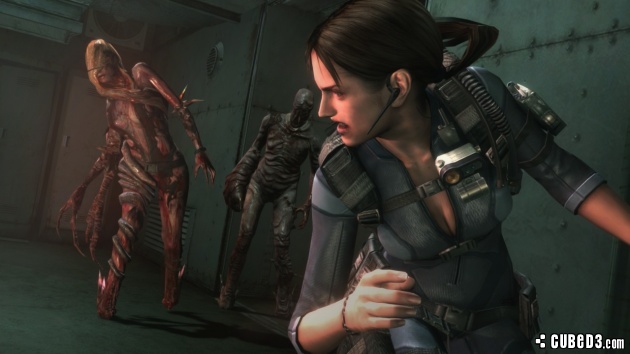
"Remaster" conjures images of mastery, so it's a fitting title in this case, considering the heavy praise the game received upon release. However, now just about every HD port of a game is being referred to as a remaster, even if the changes are as subtle as the addition of higher-definition textures.
Semantic argument aside, where are all of these remasters coming from, and why are there so many that it bears adding an entire category to "best of" shows and articles? At what point does a remaster become necessary?
The Last of Us was released in June 2013. The Last of Us Remastered was released in July 2014, just over a year later. To Sony's credit, the PlayStation 3 was the lowest-selling of the major consoles last gen (although it should be stated that it didn't sell poorly by any stretch of the imagination), meaning a lot of gamers never got a chance to play this title. This is probably also the mindset behind Nintendo's development of The Legend of Zelda: The Wind Waker HD. The game premiered on the GameCube, Nintendo's worst-selling home console of all time. Suffice it to say, re-releasing it a decade later on a new console made sense. Similar things can be said of The Last of Us: not everyone had a chance to play it, and most would agree everyone should.

What about a game like Grand Theft Auto V? It was released in September 2013 for PS3 and Xbox 360, and re-released about a year later for PS4 and Xbox One, complete with better graphics and a new first-person mode. How necessary was it, though? This wasn't a console-exclusive by a second-party studio like The Last of Us was, it's GTA. This game was in the top 100 bestselling games of all time within hours of its release. This isn't some runaway hit that not enough people had a chance to play, it's one of the biggest videogames in history.
Perhaps that's reason enough in favour of an HD port, in the end. The games industry is supposed to be moving into a new generation, and it's always unfortunate when a title releases at the tail-end of a generation of hardware. This can bankrupt a smaller company (although it's clear Rockstar was never in danger of such a thing happening). What happened, though, is that the floodgates were opened, and there's no sign of quelling the following tidal wave of remasters and ports. Gone are the days where a game being made at the end of a generation would simply be delayed into the next one, like Resident Evil Zero was back in the N64/GameCube era. Now, it's becoming a common practice to release a game as-is and then release another version of it a few months later.
Here's an off-the-cuff list of games that have been, or are being, remade for the newer wave of hardware: Darksiders 2, The Binding of Isaac, Bayonetta, Pokémon Ruby and Sapphire, The Legend of Zelda: Majora's Mask, Injustice: Gods Among Us, Kingdom Hearts 2, Xenoblade Chronicles, the entire Devil May Cry series, the entire Halo series. The Last of Us, Grand Theft Auto V, and Tomb Raider all received the remaster treatment when they were barely a year old. At any given point in time multiple Final Fantasy or Resident Evil titles ports to some platform or another can be expected, the latter culminating in Resident Evil HD, a remaster of a remaster.

One counter-argument that pops up frequently is that remasters aren't hurting anything or anyone if they are not taking development time from newer projects. It's not a bad argument, but it is one that's easily countered: no game is made without a developer devoting their time to it. If a developer is working on a remaster, it is not working on a new game, at least not in an undivided fashion. Even if a larger company buys up a smaller one to make remasters for them, that's one more game company that isn't making new games.
Take, for example, the Japanese studio Grezzo, founded by videogame legend Koichi Ishii. Ishii created the Mana series, as well as performed key work on the earliest Final Fantasy titles. Surely Grezzo is behind several ground-breaking, sure-to-be classic fantasy games of epic proportion?
If only. Grezzo has produced exactly four fully-fledged games, and three of them are Zelda remasters. Not to belittle the company, as it has made extremely high quality remasters, but it can't be helped thinking if this studio is being at least somewhat underutilised.
Another example is the Resident Evil series. Ignore for a second the fact that the first game has been remade no fewer than six times, and focus on the last five years of releases in this franchise. Since 2010, new titles include Resident Evil: The Mercenaries 3D (which is itself a remaster of portions of older games), Resident Evil: Revelations, Resident Evil: Operation Raccoon City, Resident Evil 6, and Resident Evil: Revelations 2. This doesn't seem innocuous at first glance; in five years, there have been five new games, even if only one received main series number status. However, then look at the number of remasters released in that time: Resident Evil 5: Gold Edition, Resident Evil: Revelations (HD console port), Resident Evil Chronicles HD Collection (a double remaster), Resident Evil 4: Ultimate HD Edition, Resident Evil 0 (Wii port), Resident Evil: Code Veronica X HD, and the new Resident Evil HD. Seven remasters compared to five new releases. It simply can't be said that development time isn't being taken from newer games to work on remasters; someone had to port those games.

It's not wrong of fans to want remasters; videogames get dated as technology advances, and presenting classics to a new generation of gamers is a crucial part of preserving videogames as a form of art and entertainment. That being said, it's somewhat jarring to see fans of current games clamouring for those games' remasters instead of new ones. A quick Reddit search, for example, will yield no end to fans asking for remasters of games like The Elder Scrolls V: Skyrim and Fallout 3, despite the fact that Bethesda Game Studios undoubtedly has its hands tied with a potential The Elder Scrolls VI and Fallout 4. Sure, they could pass porting duties on to one of Zenimax's other studios, but that means fewer hands to work on a new Wolfenstein, or The Evil Within, or Dishonored, and all for a slightly better-looking version of a game that still looks pretty good, all things considered, and even better when it comes to PC modding.
There's no clear-cut right or wrong time to remaster an old game. It could be argued that remastering a game as new as The Last of Us was just as important as remastering a classic like Pokémon Ruby and Sapphire. That aside, not every single game made for last-gen consoles needs to be remastered for current-gen ones. Take into account the extremely small number of current-gen-exclusive titles, and it becomes clear the driving factor behind the current rash of remasters is fear. Publishers simply don't want to take a chance on making a new game; they don't even want to take a chance on making new entries in established IP on new consoles. The last generation of gaming yielded three of the bestselling consoles of all time, so some of that fear is justified, but the absolute refusal to move onto the current generation, now over a year into its lifespan, is startling to say the least.

Fear of change in the industry is nothing new. Sometimes it's safer to, say, take a new horror-themed game and turn it into Silent Hill 4 or Silent Hill: Book of Memories, or make a dino-exploration game into Star Fox Adventures. Even most developers would probably rather see their game converted into an existing IP than be cancelled altogether. Lately, though, this fear of that bright, shining, risky wilderness known as "something new" has gotten out of hand, and has culminated in over a year's worth of last-gen games being ported up or simply remade after a few months' wear and tear. Countless dollars and man hours are being put into not creating a new game, but making sure an old one has had every last cent squeezed out of it. How about the gamers? Well, they will buy them because that's all there is. People are shouting for Skyrim on the PS4 because there's no comparable big, sweeping, open-world fantasy RPG on the PS4. They want Resident Evil HD because there is no other fixed-camera survival horror zombie game.
It's no coincidence that at the same time the industry is seeing a massive number of remasters, it's also witnessing an explosion in popularity for indie developers with their new concepts and ideas. With a few exceptions, they are the only ones putting out new games. That aside, most don't have the money to produce games as large or as long or as visually polished as the heavy-hitters so intent on releasing the same game with better textures over and over again.
Whatever the case, fear on the part of developers and complacency on the part of gamers can't be the future of the industry. Sure, remasters are cheap, they are convenient, and sometimes they are necessary. On the whole, though, it's time to stop remastering old games and start mastering new ones.
Are you for or against remasters? Should the rate of releases be slowed down or are they a welcomed addition to new consoles? Be sure to share your opinions in the comments section.

 Sign In
Sign In 08.03.2015
08.03.2015  Luna Eriksson
Luna Eriksson 
 Link to this post:
Link to this post: 
 Subscribe to this topic
Subscribe to this topic Features
Features






 Top
Top

